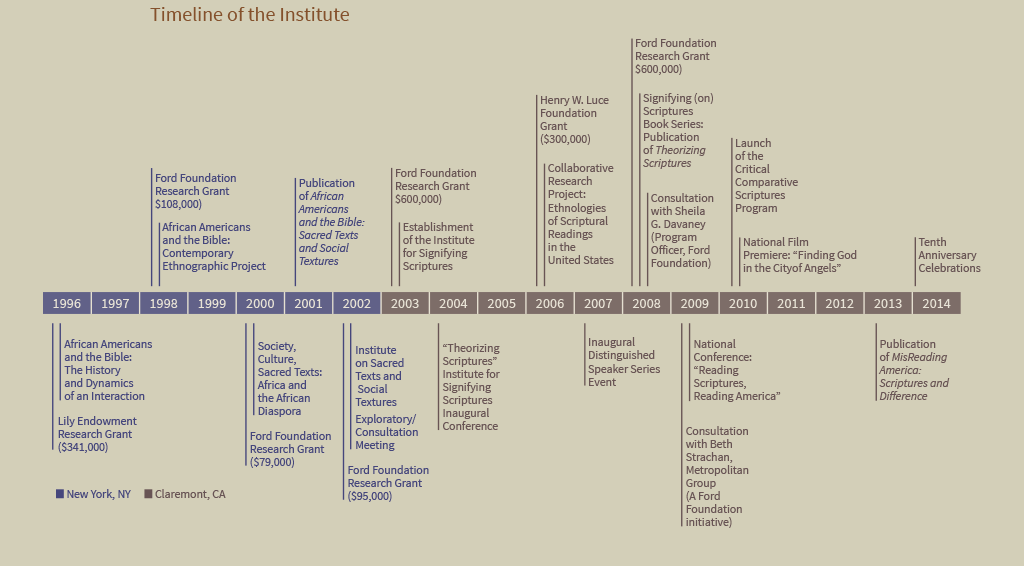
A Brief History
Named to underscore the fraught shorthand for cultural, social, political and power dynamics, especially having to do with discourse and language, the Institute for Signifying Scriptures (ISS) was, with support from the Ford Foundation, launched at Claremont Graduate University in February 2004. It sought to advance critical transdisciplinary and collaborative research in the humanities and related academic disciplines. Long before the formal launch of ISS, founding director Vincent L. Wimbush had already organized and led in the 1990s the New York-based collaborative transdisciplinary research project African Americans and the Bible. As it brought together in conversation artists, leaders of faith communities, and scholars from a wide range of disciplines to excavate the cultural dynamics and politics in African American uses of the Bible, this project was the touchstone for the establishment of ISS. The project was focused on a particular community but only as a window on to the psycho-social and political strategies and consequences of cultural formations in general. The project asked about the work African Americans and others make scriptures do to and for them; and with what consequences. Since its launch in Claremont, California, in 2004, the ISS has sponsored innovative programming and expansive research projects that excavate the work peoples do with scriptures. This excavation work goes beyond simple translation of the lexical meaning of scriptures; it asks how and why the scriptures are created and represented and performed and used among social groups. This reflects sustained interest in and focus on people, politics, power dynamics, and practices that are associated with scriptures, with particular sensitivity to the dynamics and consequences among historically dominated people.
The Brown Bag Lunch Discussion Series was for ten years the signature programming for ISS. Scholars and advanced graduate students in the region held forth on research topics ranging across a vast disciplinary terrain. The Distinguished Speaker Series featured scholars and others whose work informs and expands on the research agenda of the ISS. Among such speakers have been: Nobel Laureate Wole Soyinka; historian of religion Charles Long; cultural and literary critic Gauri Viswanathan; and novelist, playwright, poet and essayist Ishmael Reed.
Innovative and collaborative research projects sponsored by the ISS include the three-year Ethnologies of Scriptural Readings in the U.S., the production in 2009 of the award-winning documentary film “Finding God in the City of Angels” and the Scripturalizing the Human project. An academic-programmatic outgrowth of the agenda of ISS was the conceptualization and establishment in 2009 of the unique Critical Comparative Scriptures (CCS) program at the Claremont Graduate University. Centered around an ongoing seminar, CCS is compelling in its cross-cultural exploration of the anthropology, sociology, psychology, social history, expressive forms, and politics of scriptures.
The “Signifying (on) Scriptures” Book Series in collaboration with the Penn State University Press advances scholarship that widens both the circle of conversation partners and the research agenda of the ISS Signifying (on) Scriptures book series. With Inscriptions, the annual newsletter, associates, friends, and supporters have been updated regarding the latest programming and project-related developments.
In 2014 the ISS became an independent organization devoted to reaching a broader public and cultivating and advancing an even more expansive and transgressive agenda.
see essay “Taking Stock of a Rhizome” A History of the Institute for Signifying Scriptures 2004-2014

